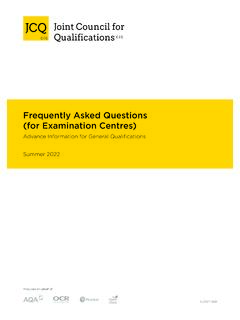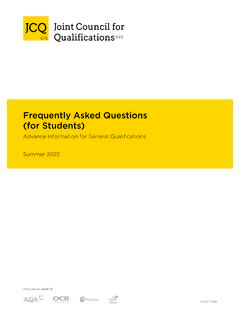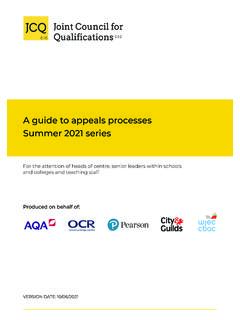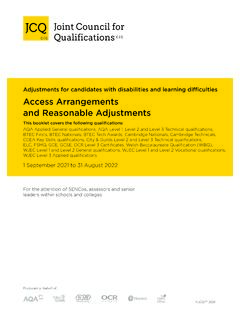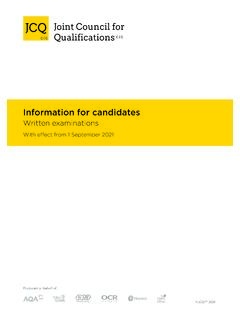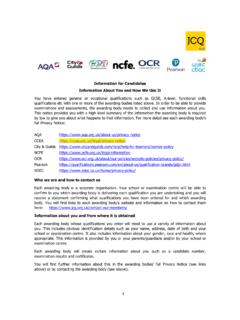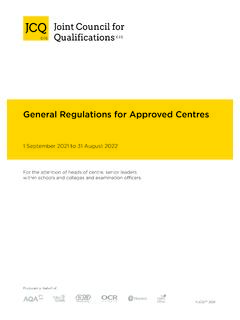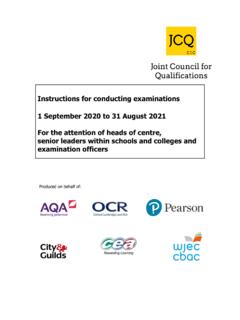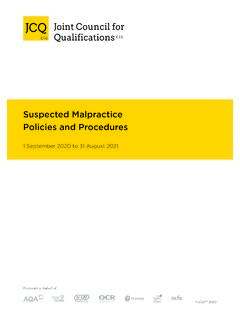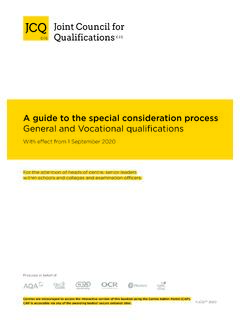Transcription of JCQ/AA/LD Profile of learning difficulties Form 8 ...
1 1 Profile of learning difficulties Application for access arrangements This form must only be used for candidates with learning difficulties who are not subject to a current EHCP or Statement of Special Educational Needs or those requiring a Language Modifier. Applications for the following qualifications must be made using Access arrangements online: AQA Applied General qualifications, AQA Level 1, Level 2, Level 3 Technical qualifications, Cambridge Nationals, Cambridge Technicals, FSMQ, GCE, gcse , O CR Level 3 Certificates, wjec Level 1, Level 2 General qualifications, wjec Level 1, Level 2 Vocational qualifications and wjec Level 3 Applied qualifications. This form must also be used for AQA and OCR vocational qualifications with externally assessed co mponents and BTEC Firsts, BTEC Nationals and BTEC Tech Awards.
2 This form must be used to collate the evidence and must be kept on file within the centre by the SENCo for inspection purposes. Please read Chapters 5, 7 and 8 of the JCQ publication Access Arrangements and Reasonable Adjustments before completing this form. The SENCo, or the assessor working within the centre, must complete Parts 1 and 3. Academic year(s) First examination series Centre No. Centre name Centre e-mail address Candidate No. Candidate name Examinations for which an application is made (This section does not need to be completed for a GCE or gcse candidate unless a referral to an awarding body becomes necessary.) Awarding body Specification title Specification entry code Component/Unit code If the candidate has previously been granted access arrangements by an awarding body, please specify JCQ/AA/LD Form 8 following access arrangements: 25% extra time, extra time of up to 50% or a scribe.
3 In addition, Form 8 must be used for all candidates who require a Language Modifier. Part 1 Candidate s name: This section must be completed by the SENCo, or the assessor working within the centre, and given to the assessor before the candidate is assessed . Within this section you must paint a picture of the candidate s needs - see section of the JCQ publication Access Arrangements and Reasonable Adjustments . For example, reference should be made to: the history of difficulties , for example, with the development of literacy skills; the results of screening tests; individual education/ learning plans in place for the candidate; school reports; pupil tracking data; information reported by subject teachers and/or support the candidate s first language is not english , you must show that he/she has underlying difficulties in their first language.
4 The candidate s difficultiesmust not be due to their limited acquisition of the english language. Please record this information under Part 1 Any other relevant information . Part 1 answer the three key statements What is the candidate s history of difficulties ? 2 What are the candidate s current difficulties in the classroom, tests and examinations? What support and adjustments are in place for the candidate in the classroom, tests and examinations? 3 Any other relevant information 4 3 Part 2 Candidate s name: This part must be completed by the assessor (see section of the JCQ publication Access Arrangements and Reasonable Adjustments) after receiving a completed Part 1 from the SENCo.
5 The assessor is not required to recommend access arrangements but to assess the candidate and discuss appropriate arrangements with the SENCo. Please use the guidance notes in Chapter 7 of the JCQ publication Access Arrangements and Reasonable Adjustments to complete this form. Please complete those sections necessary to support the application, sections on writing for a scribe. It is not permitted under any circumstances to delete sections or amend the wording on the form. Please insert n/a in the top line of boxes not completed. Evidence for 25% extra time For candidates requiring extra time, assessment evidence must relate to speed of working. Reading speed (continuous text) Does the candidate read continuous text at a speed which is below average?
6 ( at least 1 standard deviation below the mean on a nationally standardised test, a standardised score of 84 or less) YES NO Give the candidate s result on a test and/or subtest of reading speed of continuous text. Name of test (and subtest) Test ceiling Date of administration Standardised score Writing speed Does the candidate write at a speed which is below average? ( at least 1 standard deviation below the mean on a nationally standardised test, a standardised score of 84 or less) YES NO Give the candidate s result on a test and/or subtest o f writing speed. Name of test (and subtest) Test ceiling Date of administration Standardised score 4 Part 2 Candidate s name: Evidence for 25% extra time continued Is the candidate s cognitive processing ( phonological, auditory or visual processing, working memory, or mathematical processing*) in the below average range?
7 ( at least 1 standard deviation below the mean on a nationally standardised test, a standardised score of 84 or less) *The time taken to process Mathematical concepts, sometimes known as Mathematical fluency. A timedassessment of Mathematical computation is not acceptable. A mathematical processing measure will onlybe acceptable as assessment evidence for extra time in Maths NO Give the candidate s results on tests and/or subtests of cognitive processing. Name of test(s) Test ceiling Date o f administration Which type of processing does this test assess? Name of composite and standardised score Names of each subtest and standardised score (list all the subtest scores for the composite that provide assessment evidence for 25% extra time) If you have further scores for cognitive processing that provide assessment evidence for extra time please record them in Part 2 Other relevant information .
8 5 Part 2 Candidate s name: Evidence for a scribe For candidates requiring a scribe, a word processor with the grammar/spell check enabled, or speech recognition technology, assessment evidence must relate to writing skills. Spelling Is the candidate s spelling accuracy in the below average range ( a standardised score of 84 or less) with unrecognisable spelling attempts? YES NO Give the candidate s result on a test and/or subtest of spelling. Name of test (and subtest) Test ceiling Date of administration Spelling standardised score Writing Is the candidate s writing grammatically incomprehensible to someone who is not familiar with it? YES NO Does the candidate s handwriting render his or her writing largely illegible to someone who is not familiar with it? YES NO Is the candidate s writing speed in the below average range?
9 ( at least 1 standard deviation below the mean on a nationally standardised test, a standardised score of 84 or less) YES NO Give the candidate s result on a test and/or subtest of writing speed. Name of test (a nd subtest) Test ceiling Date of administration Writing speed standardised score 6 Part 2 Candidate s name: Other relevant information Evidence for 26% to 50% extra time or a Language Modifier Record all additional assessment evidence which is relevant to the access arrangement(s) required by the candidate. For each test, include the name of test/subtest, test ceiling, date of assessment and standardised score. For candidates requiring extra time of up to 50% (26% to 50% extra time) two very substantially below average standardised scores relating to two different areas of speed of working are required two standardised scores of 69 or less.
10 For c andidates requiring a Language Modifier a standardised score of 69 or less is required in relation to reading comprehension and/or vocabulary. A standardised score of 69 or less is 2 standard deviations below the mean on a nationally standardised test. (Please see sections and of the JCQ publication Access Arrangements and Reasonable Adjustments.) 7 Part 2 Candidate s name: Name of the assessor who carried out all of the tests recorded in Part 2, as approved by the head of centre _____ (Please print) Are you: an appropriately qualified psychologist registered with the Health & Care Profession s Council? YES NO Unique registration number a specialist assessor with a current SpLD Assessment Practising Certificate? YES NO APC number as listed on the SASC website an access arrangements assessor who has successfully completed a post-graduate course at or equivalent to Level 7, including at least 100 hours relating to individual specialist assessment?
